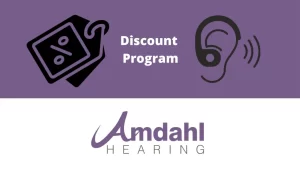One of the latest programs to hit the hearing aid market is something called a third-party discount program. Because these programs have raised several questions, we thought we’d provide a better understanding of how these discount programs work.
The Origin of Discount Hearing Aid Programs
Discount programs started showing up a few years ago. They were marketed as a way to save “thousands of dollars” on hearing aids. They were pretty active online and in the mail and sometimes on TV.
Here’s how they work. Hearing aids have historically been provided as a “bundled” package. This means that when consumers purchased hearing aids, they were also paying for fitting fees, verification processes, follow-ups during the adjustment period, warranties, loss and damage coverage, batteries, and service on the aids. Service was oftentimes included for years following the purchase.
The Problem with Discount Hearing Aid Programs
Discount programs were able to significantly reduce the perceived price by doing a few things:
- Securing a lower cost of goods by working with only one or two manufacturers, limiting the choice of hearing aids to just a couple, and promising huge numbers of units to the manufacturer
- Severely limit the “post-purchase” services
- Make very little effort to explain any of these limitations to the patient
By doing these things, discount programs created the perception of a lower price. Further, by not telling the patient about the imposed limitations, they created significant tension between the provider and the patient.
Why explain all of this? Because in the last couple of years, discount program providers have been partnering with health insurance companies. Same basic structure, except the Discount Program is being labeled an insurance benefit. It’s important to point out that while insurance companies are marketing these programs as “benefits” in most cases, the insurance company pays zero dollars toward the purchase. It also makes me wonder why a health Insurance company would spend so much money marketing a program such as this unless they had a significant financial incentive to do so. After all, we’ve never seen an insurance company market heart surgery coverage…
By our estimation, discount programs create another level of “middleman” in the process of purchasing hearing aids. Any time that happens, someone else needs to get paid, generally at the expense of one or both of the original parties.
This I know for sure. Oftentimes the initial bargain turns out to cost the consumer at least as much if not more money in the long run. “Caveat emptor.” Let the buyer beware.
In some cases, discount programs are the best option for some patients—just not for everyone. Our best recommendation is to set up an appointment with a licensed professional and have a conversation. Ask your provider specifically about the pros and cons of discount programs versus going directly through the provider. Then and only then can you make the best possible decision for yourself.
If you have any other questions regarding discount programs, hearing testing, or hearing in general, please give us a call at 320.252.0094, look up online at amdahlhearing.com or email me directly at info@amdahlhearing.com
